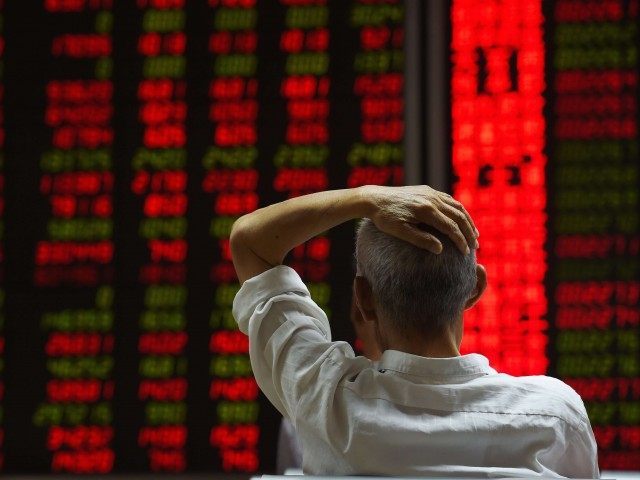China’s stock market suffered an 8.48% crash on Monday that humiliated the country’s leadership and will almost certainly cause a major Communist Party crisis.
Two weeks ago, China nationalized $6 trillion in stock losses, as the Communist Party essentially tried to halt an epic stock crash that still left Chinese stocks about $6 trillion over-valued. But the Communist Party was unable to prevent last night’s 1929-type of panic selling,
Unlike the U.S, which used a formal government bailout to stabilize banks’ losses after Lehman Brothers filed bankruptcy in 2008, China’s Communist Party leadership instructed the nation’s state-owned banks to extend $800 billion in new credit and use their balance sheets to guarantee the $8 trillion stated value of 2,800 Chinese stocks.
By suspending trading in half the issues and dispatching police to arrest short sellers and “encourage” insider-buying, Communist authorities fostered what traders sarcastically called a “Dead Kitty” bounce that China trumpeted as a sign of stability.
But as Stratfor’s John Minnich pointed out, “market capitalization of Chinese stock markets hovered around $1 trillion to $2 trillion” before the recent stock boom. At its peak on June 12, “China’s stock market capitalization, all the markets across the country, was something in the area of $10 trillion to $11 trillion.”
Lombard estimates that China’s yuan currency is 18 percent over-valued on a “trade basis,” due to devaluations of 32 percent by Japan and 21 percent by the European Union. “Contrary to the misleading general commentary based on the official year-on-year growth numbers,” China’s “export volumes fell by -5% in Q1 and -3.7% in Q2.”
With the export-driven “China Economic Miracle” over, President Xi Jinping and his Communist Party cadres launched the “Silk Road” reforms in late 2013 that would rely on a stock market boom to play a “decisive role” in funding the nation’s transition from an export to a consumer economy.
Over the next 21 months, the number of Chinese stock brokerage accounts for small individual “investors” grew from 20 million to about 100 million, as patriotic middle class families followed their glorious leaders’ call to play a “decisive role” in deepening financial markets by funding the consumer expansion. The flood of cash into the markets caused China stocks to leap by over 150 percent.
With 85 percent of stock trades in China coming from small individuals who experienced a “wealth effect” from the $9 trillion increase in China stock prices, I estimate that 100 million Chinese feeling richer probably did stimulate a $2 trillion increase in consumption.
As Breitbart News reported in “China Debt-Bomb Fuse is Burning,” China continues to be buried under “crippling local government and corporate debt.” The country’s Silk Road debt restructuring plan has consisted of banks rolling over all their non-performing state-owned-enterprise loans and relying on unsophisticated retail investors to bail out the banks by purchasing new public offerings of insolvent state-owned companies.
But with reforms amounting to “little more than creative financial-engineering,” Lombard Street Research assumes that the Chinese government will still have to nationalize $4 trillion, or about 50 percent of the nation’s GDP, worth of insolvent state-owned-enterprise loans on the books of their state-owned-banks.
Last night’s stock crash serves as a repudiation of the all-powerful China Communist Party’s control over its people and economy.
In the equivalent of a reactionary revival of Chairman Mao’s 1966 “Cultural Revolution” and its call for the public to turn-in all “revisionist bourgeois,” the China Securities Regulatory Commission’s ‘Securities Law and Futures Reporting Center’ called on the public to turn in all people engaged in “illegal behavior.” Presumably, such crimes include selling stock.

COMMENTS
Please let us know if you're having issues with commenting.